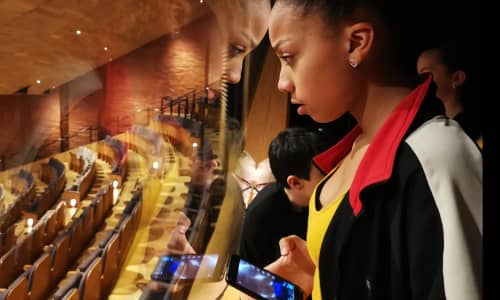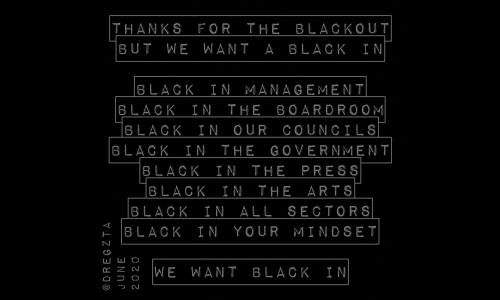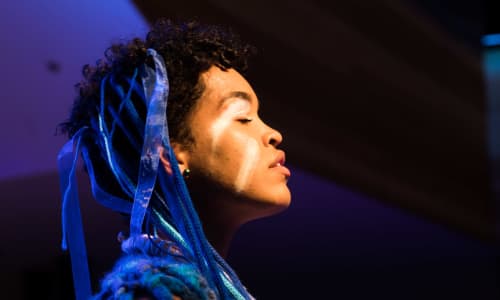If I am to be brutally honest, (which I intend to be), my career journey through the world of arts and media has been a lonely one.
More times than I care to remember I have felt alienated from the room/ office/ meeting, and all around me.
This isn’t because the people in question chose to alienate me, but because (for the vast majority of the time) my lived experience has not existed in the fabric of any other person in the space.
As a black person born in Wales the happenings that shaped my thoughts, and the lens through which I view my surroundings are absent amongst the traditional majority.

From menial topics such as what people ate for dinner, or what TV they watched, right through to more pressing topics of current affairs, and the programming in our theatre spaces.
Nobody talks about how their ackee and saltfish was on point, or how they related to the cultural nuances in the film Get Out in comparison to other works by Jordan Peele.
Or how they were affected by the ‘immutable’ comments made by Laurence Fox, and the Question Time host’s inability to address the issue with nothing more than a sweeping statement of endorsement from Priti Patel, or (except for the last couple of seasons) how productions such as Black Men Walking, or Pass Over may give some much needed theatrical relief to an audience that we traditionally programme very little for.
This is the landscape that I navigate; an industry where in Wales statistically less than 4% of staff come from a diverse background; a shocking underrepresentation which is replicated across many sectors.
So, I bear this in mind, when of late it has been suggested to me that the Centre in which I work is racist. To this point I question if viewing the issue through a micro lens that focuses on single organisations is potentially part of the problem.
"What if we were to widen that scope just for a moment and ask a bigger question; are the Arts in Wales inherently racist?"
Jason Camilleri
The answer to that question exposes the real challenge that we face; and my personal belief (based on my lived experience across my career) is yes, it is! Institutionally racist, but also unconsciously.
People just don’t know what they don’t know. Although currently the call for equality resounds unreservedly from the roof tops, and the mirror has been turned firmly inwards reflecting gross inequalities, there can be no more hiding behind a veil of ignorance. The time for change has undoubtedly caught up with the sector.
That global chorus has prompted statements of support from some organisations and companies, whilst those yet to show solidarity with the cause are being urged to do so.
But I do caution against sentiment without intent, particularly when dealing with any organisation whose track record of equality is below par.
Personally, a commitment to a definitive plan of action with long-term, embedded, sector-changing strategy would be preferred over a tokenistic statement made at the height of the furore.
So how do we change this landscape?
I have a few notions. To our people I say come forward and take your place at the table, this industry is in desperate need of enrichment from our communities within its ranks. But as my managing director once said to me… ‘Don’t settle!’
Don’t settle for just for entry level, officer level, or even management level. We need our people in all levels; executive, decision-making positions across sectors, in the board rooms, occupying the spaces that effect change; otherwise we will be nothing more than passengers in a vehicle that still doesn’t belong to us. Hence my ‘Black In’ response to the social media blackout of a couple of weeks ago.

The industry has talked the talk for way too long, and if it is to be serious about ‘diversification’, and ‘decolonisation’ then then concessions need to be made.
In order for us to take our seat at the table others need to offer up space and accept that the sector in which they currently enjoy a majority stake can never again be the one that they have gotten used to.
Is the sector ready for that? What if we were to extend that to funding? A climate where current sentiment seems content that one or two diverse-led organisations make up the quota, effectively setting the community against itself scrambling to be the funded body while the industry happily ticks its diversity box. This must change.
The sector also needs to be honest with itself. Much like the place I work, you need to hold your hands up and admit your past errors, and there have been errors.
The key is what value do you add to your practise as a result, and how quickly you can implement that learning? Not acknowledging that grievances were valid, or the effect of cultural insensitivities, are things that no young person should have to experience again. That is learning.
Admissions that the pace has been too slow have been humbly offered, and that future foundations will be built on equality. I can respect that if real action follows.

Wales Millennium Centre has done, and continues its good work behind the scenes, but recognises that ‘behind the scenes’ must now become the forefront.
Communities are called upon to help steer with intent and integrity; and although needing to unify its own visions, we have collectives of diverse artists organising and strategising; in tandem these movements provide hope that a landscape of equality is on the horizon as we walk beside those organisations that are trying to change and help them get it right.
Although to achieve this successfully we cannot pit anyone’s level of activism against another, we cannot claim that this person’s anti-racist actions are more valid than that persons.
We must support all our people whether promoting change from within the sector, or externally, working towards a unified goal under a multi-faceted approach.
When the world in which you walk is achromous, instigating cultural change can be laborious task, but I will continue to advocate for a time when the arts in Wales does not feel to people from diverse backgrounds like they exist in ‘The Sunken Place’.
As I borrow references from Get Out, statues are falling around the world, and with them the barriers to equality must crumble. We all have a responsibility post-lockdown to never allow ‘normal’ to be the same again.
Jason Camilleri - Creative Learning Producer/ Youth Arts Worker
